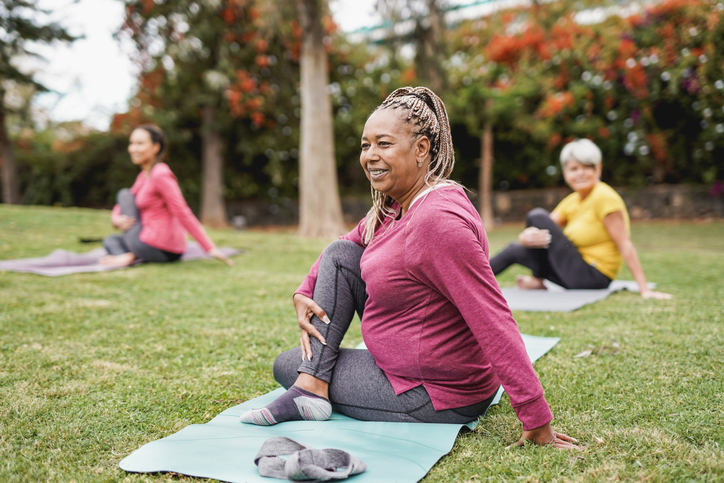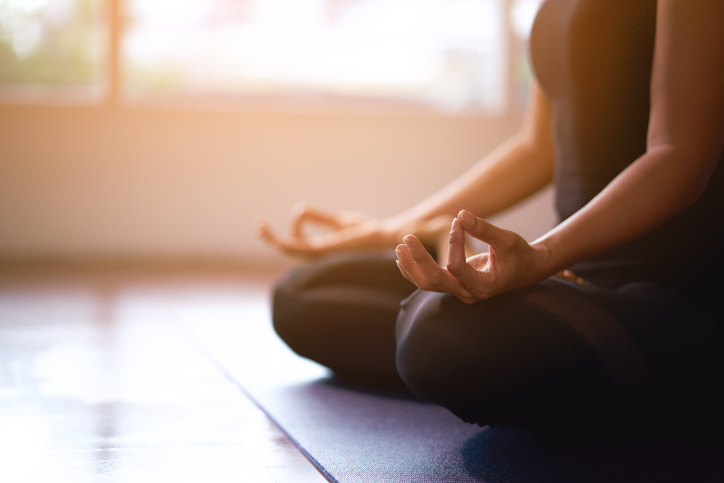
Today, the practice of yoga has spread across the world and takes on many different interpretations, shapes and forms. Traditionally, however, yoga originated in ancient India as a Hindu practice, the purpose of which was to cultivate a union between the mind, body and spirit (Yogapedia, 2020). Practicing yoga can enhance an individual’s connection with themselves and the universe, using breath and movement to shift or alter one’s energy (Yogapedia, 2020).
If you’re interested in a career as a wellness counsellor, recommending yoga to your clients is a great way to improve their mental, physical, emotional and even spiritual health. Yoga has been increasingly supported by scientific studies as a form of therapy, offering a variety of potential health benefits to those who practice (Seven Oaks General Hospital, 2020). Below, discover some of the many ways that yoga has been shown to improve one’s holistic health, and why you should consider helping your clients to incorporate yoga into their lives throughout your career as a wellness coach.
Want to Become a Wellness Counsellor? How Yoga Enhances Physical Health
Practicing yoga has many benefits for our physical health – a key component of holistic wellness. Once you become a wellness counsellor, you can recommend yoga to clients suffering from a range of physical ailments. Practicing yoga has been proven to increase muscle strength and endurance, improve flexibility and lead to greater cardio-respiratory capacity (Harvard Health Review, 2021). Additionally, the different poses and movements practiced in yoga help to strengthen the body and improve balance by enhancing the individual’s sense of spatial awareness (Yost et. al., 2020). Yoga can also serve to reduce inflammation in the body (Ezrin, 2021). Given that prolonged inflammation often leads to illnesses like diabetes, arthritis, and heart disease, practicing yoga can be important in preventing these conditions (Ezrin, 2021).

Practicing Yoga Reduces Stress and Anxiety
In addition to improving one’s physical health, yoga also has significant benefits for mental health. Recommending yoga to clients suffering from anxiety and stress can potentially help them to reduce these negative emotions in a few ways. For one, practicing yoga is correlated with lower cortisol and adrenaline levels (Nichols, 2019). Cortisol and adrenaline are stress hormones that can cause an increase in blood pressure, however, the relaxing effects of yoga and the breathing exercises that accompany it can serve to reduce the effects of these hormones (Nichols, 2019). Furthermore, yoga has even been shown to boost immunity (Ezrin, 2021). Chronic stress can wear on our body’s immune system, and as yoga alleviates stress, it can also enhance our immunity (Ezrin, 2021).

After getting your wellness coach certification, you can also recommend yoga to your clients as a means of reducing their anxiety. According to research, those with anxiety disorders tend to have lower levels of gamma-aminobutyric acid (GABA) (Nichols, 2019). Yoga has been shown to increase GABA throughout the body, indicating that its practice can potentially be used as a treatment for anxiety (Nichols, 2019).
Yoga Boosts Our Mood and Increases Energy Levels
If you’re interested in becoming a wellness counsellor, you probably already know that our overall well-being is closely correlated with our levels of energy and our ability to regulate our emotions. However, what you might not know is that practicing yoga can increase one’s energy and improve their mood and emotional responses.
Studies have shown that yoga improves the brain’s mood and executive functions, both of which contribute to a healthier regulation of emotional responses (Nichols, 2019). As previously mentioned, yoga also increases GABA levels. More GABA in the brain can not only reduce anxiety but is also associated with positive emotions and mood (Seven Oaks General Hospital, 2020). Lastly, practicing yoga forces the body into motion, and through the breathwork that the practice consists of, different energy blockages can be cleared (Yost et. al., 2020). This creates space for more energy to flow throughout the body, increasing overall energy levels (Yost et. al., 2020). As a future wellness counsellor, incorporating yoga into the strategies you implement for your clients can help them succeed in achieving a higher state of wellbeing.
Are you looking for the right wellness college in Vancouver?
Discover where a diploma from Rhodes Wellness College can take you today!
Works Cited:
Ezrin, S. (2021). 16 science-based benefits of yoga. Healthline. Retrieved December 14, 2021, from https://www.healthline.com/nutrition/13-benefits-of-yoga
Harvard Health Review (2021). Yoga – benefits beyond the mat. Harvard Health. Retrieved December 14, 2021, from https://www.health.harvard.edu/staying-healthy/yoga-benefits-beyond-the-mat
Nichols, H. (2019). The research-backed benefits of yoga. Medical News Today. Retrieved December 14, 2021, from https://www.medicalnewstoday.com/articles/326414
Seven Oaks General Hospital (2020). Health benefits of yoga. The Wellness Institute. Retrieved December 14, 2021, from https://wellnessinstitute.ca/health-benefits-of-yoga/
Yogapedia (2020). Yoga. Retrieved December 14, 2021, from https://www.yogapedia.com/definition/4/yoga
Yost, A., & Jane, M. (2020). 5 wellness benefits of yoga at any age. ThinkHealth. Retrieved December 14, 2021, from https://thinkhealth.priorityhealth.com/5-wellness-benefits-of-yoga-at-any-age/









